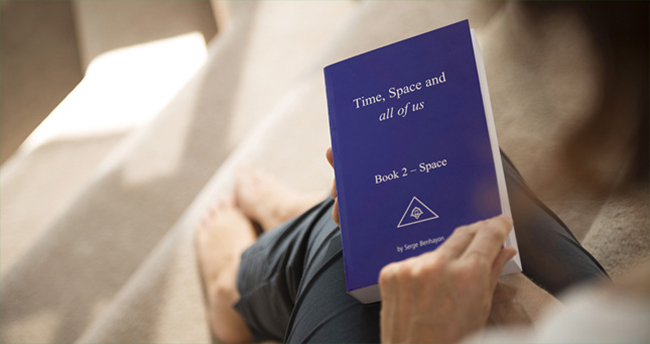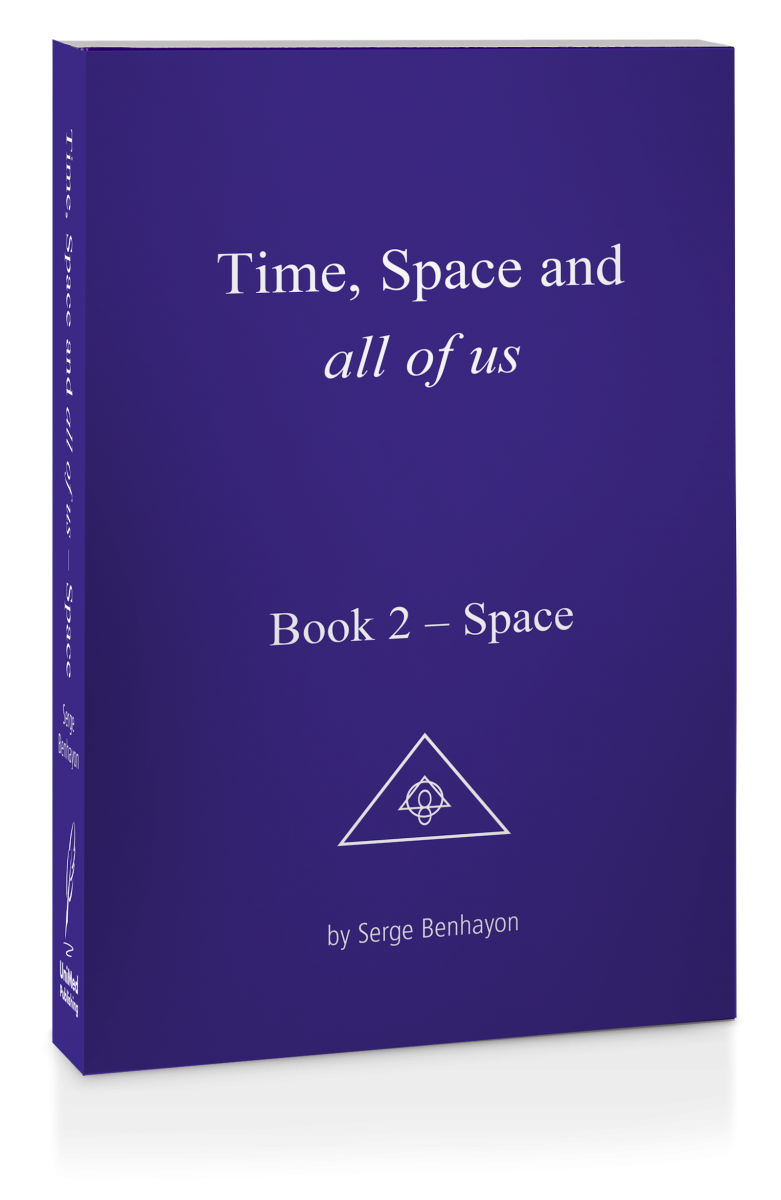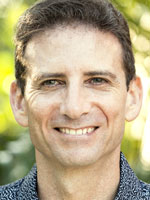From the Space Master: You are What You Occupy A review of Space, 2nd book in the Trilogy: Time, Space and all of us

by Dragana Brown, Writer and Correspondent, London, UK
“- - at the heart of simplicity ticks the potency of genius.” Leucippus
On Leucippus’ and all other accounts, Serge Benhayon, the author of Space, the second book in the trilogy Time, Space and all of us, is indeed a genius.
And yet historically, when a great soul appears and injects the world with ancient wisdom and teachings and the works of many geniuses before him, it is on the whole not only not given the respect and honour it so richly deserves, but it is commonly dismissed, rejected and ridiculed too, owing to the fact that in the land of mediocrity, sadly, genius is perceived as a hazard.
The simple truth is we do not like people who do not resemble us. We find his extraordinariness too much to receive or to welcome, and in return the respectable academia starts pulling the strings on alarm bells whilst forming an alliance against the messenger.
Still, be that as it may, the heart of Universe beats and drums marvellous harmonies in his movements and in his words burns an aeons old flame. Aside from prolific and remarkable writing, that is precisely what Serge Benhayon does the best –– walks in the rhythm of a tune from higher dimensions, unbound and unlimited by the realm of life we have chosen to call our ‘home’, which doesn’t enter into the league of even our ‘second home’.
So what do we learn from a man who is super astute, sharp and owlish, and from his Space book, that hadn’t already been covered in physics, astronomy, astrology, maths, architecture…. anything that we haven’t known or heard before about space?
We have been exposed to images of space our whole lives; from paintings by artists and designers, to pictures using modern technologies and more abstract science fiction images and even various depictions as products of our own imagination. But whilst we have been over saturated by visual images of space, do we genuinely have an understanding – a sense of what space sounds, smells, feels and even tastes like? Or have we not settled with a constricted version of space, the one that is completely out of place, because it does not belong to the movement of the Universe, nor is it in accord with the space we are held in?
We have come to know space as a term that can refer to various phenomena in science, maths and communications. We know it in reference to the time interval separating two characters, bytes, octets or words in a digital signal, during which no signal is transmitted. We hear of interplanetary & intergalactic space where some scientists believe that space extends infinitely in all directions, while others believe that space is finite but unbounded, much like the Earth.
In mathematics we learn that space is an unbroken continuum in which three numerical coordinates (3-D space) define the location of any particular point.
Space may also be used in architecture as an undefined space given to the architect to define it using shapes, colours and geometry.
So what did Winston Churchill mean when he said: “We shape our buildings; thereafter they shape us”?
Perhaps the answer is given in this astounding volume, in the following statement by Serge Benhayon: You are What You Occupy.
And yet, Serge (and Churchill perhaps too) is not talking here about buildings. He, dear reader, is talking s p a c e
But have we made ourselves way too human to comprehend this and the vast space we actually come from?
Have we, in our desire to preoccupy space, come to a space where we “Can’t see the forest for the trees” or as Serge Benhayon, the space master of this palatial publication expands on the idiom – has the 3rd dimensional, physical world overshadowed the multidimensional energetic activity to the point that we would vehemently deny its existence with all our might?
And with that, have we, against all the Universal orders, wilfully created a market space where entropy reigns supreme?
Instead, what would we do if we were ever asked to consider that space can educate us to understand human life to the core and what it is all about? In fact, we are also given an answer for consideration by Serge Benhayon, that the space that is called God or Universe is where we can source all the wisdom and intelligence to understand who we are, where we come from, where we are going and what our relationship with space is all about. And as a bonus we’d be bathing in this pool of all-knowing, where we don’t even need to remember a single PIN or password!
Through science we know that the atoms that make up everything (including human beings) are virtually empty, made up of atomic nuclei composed of protons and neutrons tightly packed together, and electrons that orbit outside around the nucleus. In essence, protons, neutrons and electrons make up everything we can see and touch. Between nucleus and electrons there is a vast space. Atoms are about 99.9999999999999% empty space. Which means we are relatively vast and empty too. Say for example, if a person’s nucleus is in London, their electrons would be somewhere in northern France. (Warning – do not try this experiment at home)
However, and in truth, there is no such thing as empty space. As the Space author says: “whatever we build, mix or put together, once it is assembled, it will occupy space in the form and in the integrity that it was formed.”
What then resides in the space between our nuclei and electrons? Aided by Einstein’s E = MC2 and the fact that everything is energy, empty therefore cannot mean that there is nothing there. For if everything is energy there has to be energy in every space. The key, as the writer points out time and time again, is in knowing what type of energy to choose to occupy the space.
We are great if not masters at filling space, but pretty poor when it comes to feeling space. Although we normally associate the word filling with a physical act of putting something into something, this is not necessarily so. It is with every move that we make, be that in a physical or non-physical form, that we are actually making a choice how and what we fill the space with. And so, how we express will determine the quality of space around us and “what we construct that will occupy space.” Whilst we remain in a collective will to remain ignorant and arrogant, we continue to suppress our awareness of space and beyond space to a level such that we wouldn’t know it’s there, even if it slaps us in the face.
“What if there is a way to make, produce, build or express something that, yes, takes up space in the form that it is, yet does not interfere with the overall quality of the grand space it is in and thus, it is not occupying space but expanding it?” SB
If we cannot stand before this brilliant piece of writing in absolute AWE, with no certainties whatsoever, but with open minds and open hearts, then we have double bolted the grand Universal doors and disposed of the key to the kingdom of wisdom that the grey matter which occupies space between our ears cannot fathom or interpret.
In the end, as is the case with every single piece of writing authored by Serge Benhayon, one is left to either revere or ridicule this prodigious piece of pure mastery. And yet, no conviction could ever alter the Truth this Universal man so graciously shares with the world. It is the truth already known to us all, but sadly not yet lived.
To opt to be unaware or aware is always our choice to make and ours alone, and we have all the space in the Universe to make the choice, for living in ignorance is pretty exhausting (reflected in the coffee share price’s constant increase), as it requires huge effort.
And so to borrow from the author, who in an open and allowing Shakespearean manner asks: “Will you arise or will you dig deeper?”
Either way we are for sure on a merry-go-round of returning to all the space that we know and come from. The circular wheel which one day will cease to spin, so we could hop off from the anti-evolutionary railings we’ve been not so merrily chugging along for aeons and return, Hansel & Gretel style, tracing back our footsteps and picking up along the way all the previous choices and all that accompanies them – which we assumed we had conveniently left behind – to find our way back home to know the great knowledge and wisdom we have long, long ago abandoned. All that we’ll ever need for the journey is already within the space that beholds us. The key is to initiate a relationship with space, which is connatural to us, for our particles are the intelligence of universe.
From this authoritative penmanship you get the notion that this is the most important of all voyages of (re)discovery, and without it, all the rest are not only useless, but disastrous. We must clock that we have nothing to gain by sailing into space if we are not able to cross the abyss, right here on Earth with two feet firmly on the ground, that has separated us from ourselves and from the grandness we originate from. Unsurmountable? Far-fetched? Not so if space is given for the book to sink in and do the job it is here to do.
So, sit back and watch this Space!




